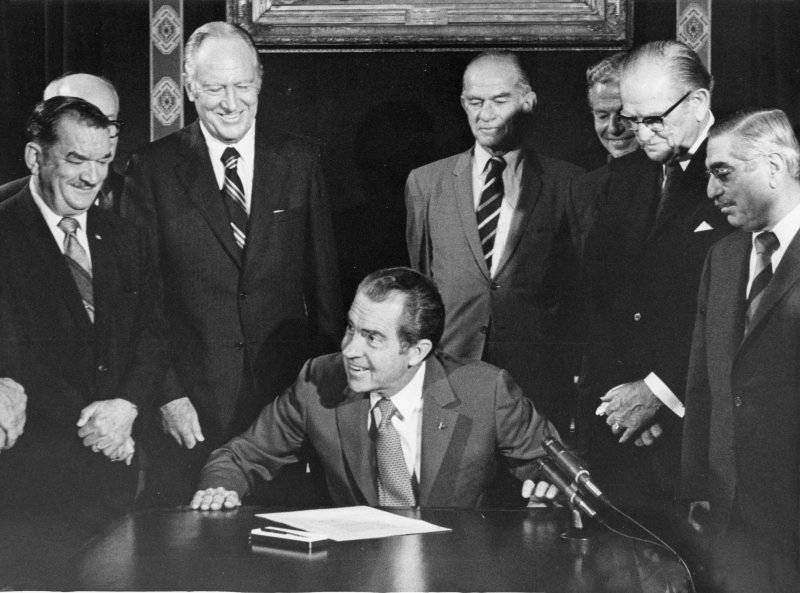Pres. Nixon seems pleased with himself after signing an historic agreement pledging the U.S. and Russia to freeze nuclear offensive weapons at their current levels. Watching the president in the Treaty Room of the White House on September 30, 1972, are, LTR: Rep. Clement J. Zablocki, D-Wisc.; Secy. of State William Rogers; Sen. J. W. Fulbright, D-Ark.; Rep. William S. Maillard, R-Calif.; Sen. John Stennis, D-Miss.; and Sen. John Pastore, D-R.I. (UPI {Photo/Frank Cancellare/Files) |
License Photo
WASHINGTON, July 6 (UPI) -- In several days time, the P-5 Plus One nuclear talks with Iran should reach resolution, one way or the other. This is a virtually zero-sum situation. Either both sides will reach an accommodation on how to ensure Iran will not and cannot build nuclear weapons for years to come or they will not. And even if a short extension is reached, at some stage this negotiation will still end.
Of course, no matter if talks succeed or fail, the process is far from over. Critics will attack success or failure, ironically on similar grounds that the P-5 should have been tougher; sanctions should be given more time to work; and Iran cannot be trusted. If there is agreement, implementation will face many tests and challenges. Some fair, others not, as certain members of Congress and certain Middle East capitals will remain adamantly opposed. If there is no agreement, then talk of using military force to deny Tehran nuclear options will surely intensify as will tensions and prospects for crises.
Since the end of World War II, America has produced two tectonic shifts in international politics, both conceived and born during the Nixon Administration. The two were irreversibly intertwined. The first was Richard Nixon's historic trip to China in February 1972 ending three decades of hostility.
The second was the arms control pacts reached with the Soviet Union with the Anti-Ballistic Missile Treaty and the Strategic Arms Limitations (SALT) executive agreement that put limits on both sides' intercontinental nuclear weapons, signed in Moscow in May 1972. It took a conservative Republican with impressive anti-communist credentials to pull off this reversal. Yet, despite these accomplishments, substantial opposition over détente with the Soviet Union and rapprochement with Red China persisted.
Real politick, along with Nixon's triangular strategy to play Beijing against Moscow in part to help wind down the war in Vietnam, were the drivers in this transformation. Certain parallels exist today with events in the Middle East, especially the catastrophes unfolding in Iraq and Syria. Clearly, Iran is not China or the Soviet Union. However, suppose these talks lead to an enforceable and verifiable agreement. How might that play out in the context that US détente with Russia and China changed international politics?
The Cold War was largely a bi-polar world defining much of the latter half of the 20th century. The 21st century is profoundly different. Today, the old Westphalian system of state-centric politics has been challenged and in some cases superseded by the empowerment of individuals, transnational organizations and non-state groups from Osama bin Laden to the Islamic State. One consequence is that many global events are interconnected. For example, Russian incursion into Ukraine affects and is affected by how events in Syria, Iraq and Iran along with U.S. involvement are evolving.
Understanding these linkages is crucial to forging a successful 21st century strategy.
Given an agreement with Iran can be reached, why then would missile defenses be needed in Europe against a threat that no longer existed? That means US missiles in Europe to defend NATO could be withdrawn, keeping the sites in place as future insurance if conditions change. If missile defense were no longer a visceral danger to Moscow, could that lead to a new detente? And any improvement in relations could make a solution in Ukraine finally viable as neither Russia nor Europe has any interest in keeping this a frozen conflict.
In Syria, Moscow and Tehran support Bashar al Assad. But an Iranian nuclear deal with the West will relieve economic sanctions on Tehran. Hence regional stability is far more economically relevant. Could a political solution therefore be reached in Syria with Assad standing down brokered by Russia and Iran and the good will that might follow a nuclear deal?
In the 1970's, the U.S. maintained a two-pillar policy in the Gulf in which (Sunni) Saudi Arabia and (Shia) Iran were allied against the more dangerous Soviet threat. While the Islamic State (IS) is no Soviet Union, it is the largest danger both to the Saudis and the Iranians. Whether that can translate into a new strategic balance given agreement with Iran may be a bridge too far. The point is that should an agreement be reached, other opportunities could follow.
Hardboiled critics will decry such scenarios on the grounds Iran cannot be trusted nor can the Saudis and Russians for that matter. Nonetheless, when he entered office, did anyone think that Nixon would go to China and to the Soviet Union three years later? Barack Obama is not Richard Nixon. But that does not mean opportunities do not exist if we are clever, innovative and inventive enough to consider them.
__________________________________________________________________
Harlan Ullman is UPI's Arnaud de Borchgrave Distinguished Columnist as well as Chairman of the Killowen Group that advises leaders of government and business and Senior Advisor at both Washington D.C.'s Atlantic Council and Business Executives for National Security. His latest book is "A Handful of Bullets: How the Murder of Archduke Franz Ferdinand Still Menaces the Peace."















